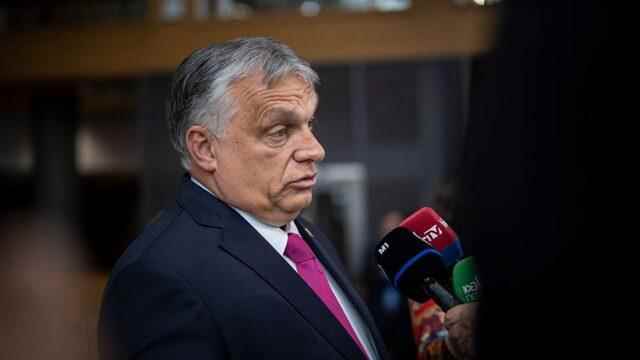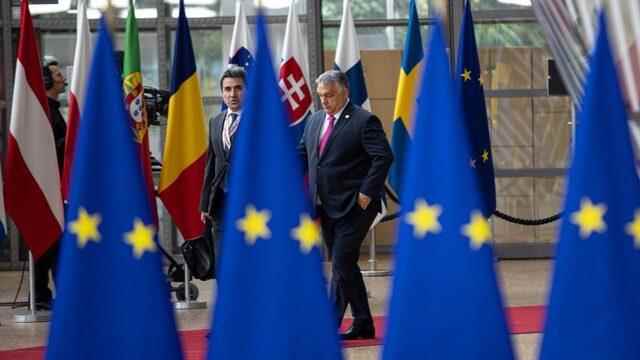In Hungary, a new one has been added to the ongoing debates between Budapest and Brussels for years, with the claims that the rule of law practices are lacking.
In April, when the European Union commission did not receive a satisfactory response to its allegations that there were doubts and corruption in the distribution of EU funds, legal proceedings were initiated against Hungary and the files were sent to Budapest.
Following this, the EU commission recently took concrete steps regarding the violations of law in Hungary and referred Hungary to the Hague Court of Justice on some issues, and initiated new violation proceedings on some issues.
The first issue Hungary must answer before the Hague Court of Justice is the “Protection of Children and Families” law, which was enacted last year and is one of the materials used in the government’s election campaign.
Is the aim to protect children or to put homosexuals in a difficult position?
The law, whose purpose was determined as the protection of child abuse and families, but which resulted in a significant restriction of the rights of gay and LMBTQ-oriented citizens in practice, was seen by the European Union as an application of “discrimination in terms of sexual orientation” and “restricting equal citizenship rights” by the European Union, and the law was withdrawn. withdrawal was requested.
The Hungarian government did not withdraw the law and took the issue to a referendum to be included as a constitutional article, but the referendum was deemed invalid because the required voting rate could not be reached.
The Commission says that “protecting children and families is one of the fundamental principles of the European Union”, but argues that this is not the purpose of the Hungarian law. The law in Hungary recommends that “content that promotes or advertises gender-neutral identities, transgender or homosexuality at birth should be prohibited or bagged for under 18s”. The European Union commission requested the Hague Court of Justice to decide on this issue.
radio stripped of its frequency
Another issue Hungary has to answer before the Court of Justice of The Hague is that the frequency of Klubradio, one of the independent radios in the country, is not renewed. The frequency right license of Klubradio, which is one of the popular radios of the country’s media, has been broadcasting independently on the same frequency for years and is known for its oppositional drawing, was not extended last year.
Klubradio applied to the court, but his appeal was dismissed. Radio complained that the conditions demanded of it were not requested from any other institution. The EU commission says that the implementation of independent radio is “the result of disproportionate, biased and non-transparent conditions” and underlines that the EU’s concerns sent to the Hungarian government on this issue are not taken into account.
The issue of independent media has been a hot topic in Hungary in recent years. The purchase of some newspapers and websites on opposition lines due to financial difficulties, making them unable to broadcast, or losing their frequency, as in the case of Klubradio, is considered a violation of “freedom of the press”. The EU commission has expressed similar concerns, but the Hungarian government insists that implementation takes place within the framework of law. The Hague Court of Justice will now decide on this issue.
New violations, new investigations
The European Commission has launched two new violation investigations. The first of these is the application of different price tariffs to vehicles with Hungarian license plates at gas stations in Hungary and different price tariffs to foreign vehicles.
In order to protect the purchasing power and living standards of the citizens, the Hungarian government applied state-supported discounted tariffs both for electricity, water and natural gas consumption in households and for fuel used in vehicles.
Until now, every domestic and foreign vehicle that filled its tank was given the opportunity to buy fuel at this discounted tariff, without making any plate separation. However, due to the extraordinary increase in fuel raw material prices in the energy crisis that came to the agenda after the start of the Russia-Ukraine war, the Hungarian government prevented vehicles with foreign license plates from buying gasoline at a discounted tariff.
The European Commission considers that this practice is a blow to the European integrated internal market. In order to protect the equal rights of consumers, the European Union demands from the Hungarian government to end the discriminatory practice and is waiting for an explanation.
Of course, the fact that Hungary obtained the status of exception regarding the embargo against Russia also plays a role in the background of the commission’s objection to cheap gasoline only to Hungarian citizens. As it is known, Hungary opposed the oil embargo against Russia and managed to stay out of the embargo.

And the last issue of violation brought against Hungary by the EU commission is on the export of grain. Hungary has tied the grain exports to be made by companies from the country to special permission with a decree. The European Union is of the opinion that this practice is again aimed at the integrity of the European common market and the equality of consumers, and wants an explanation from the Hungarian government on this issue.
If the explanations are not deemed sufficient, these issues are also kept on hold by the Commission to be sent to The Hague.
What might be the Hungarian government’s reaction?
Hungary is facing serious economic problems after Viktor Orban’s big victory in the last April elections.
12% inflation and the depreciation of the national currency Forint, which reached 20% in the last six months, upset the financial balances of the country. Financial aid from Brussels has also been cut since the beginning of the year. The increase in the policy rate to 9.5% by the central bank could not slow the acceleration of the deterioration in the economy.
Demonstrations began in Budapest, with the recent introduction of a new law that increases the tax burden of certain small businesses, with roads and bridges closed to traffic by protesters.
On the other hand, the latest development this week was to put an end to the reduced tariffs for electricity, natural gas and water consumption in households, which the government has been implementing for years and seen as one of the most important gains by the voters.
Economists point out that fiscal balances are very fragile. It is clear that the country desperately needs new financial resources.
This is the reality behind the government’s re-applying to Brussels last week to receive the funds cut off at the beginning of the year and conveying the message that it is ready for an agreement.
These conditions indicate that the balances in the debate that has been going on for years have now shifted in favor of Brussels.
